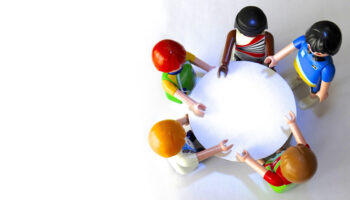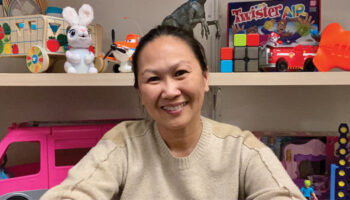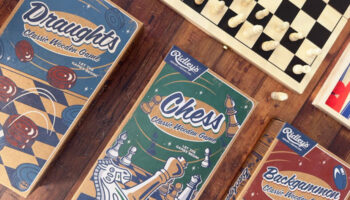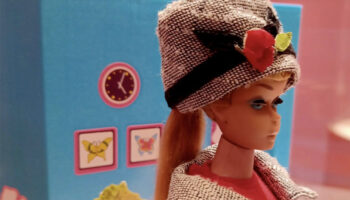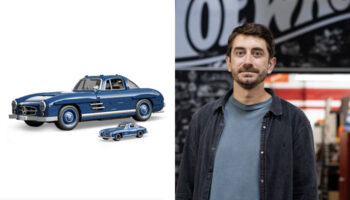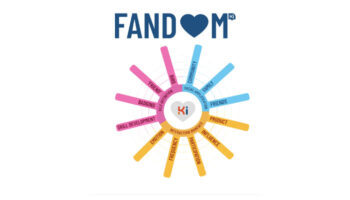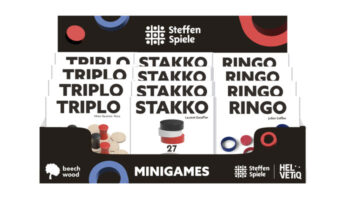Scrabble at 75: Deej Johnson and guests celebrate the iconic game in 7.5 fantastic sets

1948 saw a few inventions struggling to make their mark. The motorised surfboard, for example, sank – if you’ll forgive the pun – without trace. A spoon outfitted with a cumbersome fan to cool down your soup also fared poorly. It seems the public wasn’t quite ready for a surfboard that made it easier to surf, or a soup spoon that made it harder to eat soup…

To be fair, it does seems the latter was intended to be jocose. Elsewhere, though, Scrabble inventor Alfred Mosher Butts – a New York architect – discovered the public still wasn’t quite ready for his idea either. By then, the bespectacled and amusingly named man had already spent around 15 years toiling on his word game shortly before it appeared to become an overnight success.
As I write this, 45,290 nights have passed since Butts himself was born. That means tomorrow – April 13th 2023 – is not only the 124th anniversary of his birth, but also International Scrabble Day in the game’s 75th year. For those reasons, Mojo Nation here presents Scrabble at 75: A Celebration in 7.5 Sets. And naturally, we start with the classic…

1 Scrabble: Classic
Alfred Mosher Butts. At the end of this piece, we’ll briefly look at this inventor’s short-lived early game and long-sought later success… For now, it’s enough to say that after Macy’s began stocking Scrabble in 1952, it quickly become a craze and a classic. Even today, the original Scrabble remains the granddaddy of all word games. But why is it SO popular?
As Ray Adler, Vice President and Global Head of Games at Mattel, says, “Scrabble had thrived for 75 years because of one simple truth… It’s not how many words you know, but how they’re used that matters. The game harnesses the power of words and celebrates the benefits of positive expression through the simple, equitable fun of building words together on a game board.”
Hasbro’s Director of Global Product Strategy and Marketing, Megan McCourt, adds to that: “Scrabble is rooted in language – something truly timeless. It’s a great platform to bring different people together and share in a fun experience – whether it’s a light, social game night… Or an intense competition.”

2 Travel Scrabble
Released at a time when the travel version of a game wasn’t de rigueur, 1958’s Travel Scrabble was designed with two specific goals. As Mike Bucher, former MD of Spears Games recalls, “The design emphasis wasn’t just to make a physically smaller version… It was also to ensure the tiles remained in place so gameplay was possible during travel…” The solution? A really interesting feature! The tiles – somewhat reduced in size – had little prongs on their rear corners… These allowed the tiles to fit into some of the 256 holes on the smaller, more portable board.

3 Simpsons Scrabble
The rather convoluted way in which Scrabble’s rights have been managed, licensed and sold means that – by 2007 – two separate versions of Simpsons Scrabble had reached shelves. One was from Hasbro, which holds the US rights, and one was from Mattel in the rest of the world.
Mattel’s, pictured above, featured a special pack of cards. On your turn, these either helped you – or hindered your opponents. Speaking in 2023, the set’s designer, Jim Harrison, told us more: “We had so much fun with this! Mattel, Fox and the Groening studio were great partners… They were closely involved in all the changes we made – including entirely re-designing the board on one side.”

While the gameplay in the Mattel version differed from Hasbro’s, both allowed you to play words that were invented or popularised by the long-running show. It’s also worth noting that a few of these do, in fact, now appear in The Oxford English Dictionary. These include, CROMULENT, DOH and EMBIGGEN. No listing yet for kwyjibo, sadly. Perhaps, though, that could change in the wake of a spirited march to Downing Street…

4 Computer Scrabble
To younger readers, the technology in this image must seem – as Star Trek’s Mister Spock might put it – hardly very far ahead of stone knives and bearskins. In 1983, though, Psion’s cassette-loading version of Scrabble was a revelation. Developed for the Sinclair ZX Spectrum by programmer Steve Kelly, you could play the computer itself or, indeed, up to three other people in the room. Speaking in 2023, Steve Kelly told us, “I don’t know what you’re talking about. You’ve obviously got the wrong Steve Kelly.”

5 Asprey Scrabble
Lists like these almost always include something opulent that makes you ask, “Who’s got that kind of money to spend?” and, “Are they married?” Ours is no different! The iconic luxury brand Asprey makes a highly exclusive version of Scrabble. While the base box is crafted out of luxurious bullskin, the board and letter tiles themselves are made in sumptuously soft lambskin. You might expect to pay a pretty penny for such a exquisite set, but it actually comes in at a very reasonable £1,400. Oh, no – wait! Sorry… It’s £11,400 – around $13,616.

6 Scrabble Crossword Cubes
Roll the dice, set the timer, make your words! Taking it in turns with the aim of making a high-scoring word grid, this 1964 brand extension had a lot going for it…
As with the parent game, you pick up points based on the scarcity of the letters you put down. The first to reach 200 wins. Although Scrabble Crossword Cubes isn’t available today, it’s something of a primogeniture for Bananagrams Duel. The latter – which comes in a plastic travel banana – is the direct descendant of the now defunct Zip-It, created by Abe Nathanson.

7 Scrabble Foreign Language Editions: Latin
As Scrabble’s popularity grew, foreign-language versions became an inevitability. Today, there are nearly 40 official editions available. These include Spanish, French, German, Afrikaans, Ukrainian, Welsh and Latin. Naturally, the publisher of these sets must adjust the letter distributions and values – sometimes with interesting results…
In the Latin edition, for example, the good people at Tinderbox Games have matched the points on the X, V and I to their corresponding Roman Numerals… In other words, an X is worth 10, a V is worth 5 and an I is worth 1. I don’t mind telling you, that’s the most brilliant thing I’ve heard all week! And yes, I know what you’re thinking: Mihi opus est excedere domum saepius.

7.5 World’s Smallest Scrabble
The 0.5 entry in this list is actually closer to 0.05… It’s a diddy little replica, measuring around 7cm by 4.5cm by 1cm. Made by Super Impulse, licensed by Hasbro and sold as World’s Smallest Scrabble, it’s small in size but big on fun.
Once opened, the board still fits comfortably in the palm of your hand. The gameplay is exactly like the original, but the tiles cling to the board’s surface magnetically to save undue fiddling. The only thing I find a bit baffling is that – as well as three spare blank tiles – this set also appears to include an extra N. Perhaps it’s like the N in DAMN… It doesn’t really need to be there, but as long as it’s not doing anyone any harm, they leave it alone.
By the way, for anyone interested in the world’s LARGEST Scrabble board, Guinness World of Records has you covered. The august body notes that one board, created by Mattel in 1998, had a surface area of 30 metres. The tiles – made of reinforced fibreglass – measured 1.5 metres squared. And who played with this incredible set? Why, the British Army and Navy, naturally.

Wrapping things up with a giant Scrabble set seems to be entirely appropriate as we turn our attention – more for completeness sake than anything – to a potted history of one of the biggest games that ever there was. Here, then, is a short look at Scrabble’s antecedents…
Pre-Scrabble…
Before finding the right note with Scrabble, budding inventor Alfred Mosher Butts tinkered with and touted about two earlier variations. They were called Lexiko, and Criss-Cross Words – also known, very briefly, as It.

Lexiko
The earliest version of the word game we recognise as Scrabble was 1933’s Lexiko. Developed after inventor Butts temporarily lost his architectural job in 1931, Lexiko saw players attempt to make words from randomly chosen tiles. The way in which he determined how many of each letter to include in Lexiko was as time consuming as it was important.
In fact, it says a great deal about Butts that he rather enjoyed writing sheets and sheets of notes as he counted and logged the letter frequency in popular newspapers of the day. It’s probably fair to say, though, that the weight of this analytical approach somewhat showed in the gameplay. By all accounts, Lexiko wasn’t very good…
The words you aimed to make, for example, had to contain a rather intimidating nine or ten letters. Perhaps unsurprisingly, the publishers to whom Butts began pitching the game in 1933 were – in vocabulary of appropriate length – ‘apathetic’ and ‘impassive’.
Even while writing to games companies, Butts continued to make and sell his own copies of Lexiko. Over the course of a year, he sold 84 copies at a total loss of around $20. At that point, Butts knew the game needed complete revision. Basing his next approach on the layout of a crossword puzzle, he added a board, created a points system on the tiles and began developing the game known as Criss-Cross Words.

Criss-Cross Words
Aside from the fact that play initially started in the board’s top-left corner, this 1938 game was as close as one could get to Scrabble without actually being Scrabble. After much experimenting, it consisted of a board divided into a 15 x 15 grid…
There were also numerous bonus squares: some worth double points, some worth triple. The number of letters one aimed to play reduced from nine and ten to seven… The gameplay was pretty solid. Even so, Alfred struggled to find either wide interest or a manufacturer for his brainchild as millions of people stared at the spectre of the Second World War.
Scrabble Arrives
Butts made little further progress on his vision of a tile-based word game until 1947. Indeed, to some extent it appears that he may have given up on it. Around that time, though, he was approached by the soon-to-quit welfare worker James Brunot. Brunot – who had played Criss-Cross Words and was, it seems, in search of a project on which he could work at home – suggested he be allowed to market it.
When Butts accepted, the two men – supported by Brunot’s wife, Helen – changed the board’s cosmetics, added and removed various bonus squares, copyrighted it and, finally, changed the name of the game to Scrabble. This vital tweak was filed as a trademark on December 16th, 1948.
Just as importantly, the Brunots found a practical way to get the game made; a blend of cottage and wider industry. While Brunot hired local woodworkers to produce the tiles, he had the boards printed professionally… And assembled the whole kit and caboodle on his kitchen table. The Brunots continued with this rigmarole for a number of years, despite slow sales.

Scrabble Takes Off
By 1952, when sales had increased enough for Scrabble to plod along, chance conspired to put a copy in the hands of Jack Straus, then Chief Executive Officer of Macy’s. Life magazine later reported that he’d played the game while on holiday and – upon returning – was disappointed to find his store didn’t stock it. If legend is to be believed, Straus then placed a large order, setting a precedent for other retailers, and the subsequent sales helped cause something of a snowball effect…
By 1954, the snowball was rolling fast! The game featured on TV’s The Today Show and in the magazines Life, Reader’s Digest, Time and Vogue. Brunot had started to release different versions to capitalise on the idea. In that year alone, it became one of the biggest selling games in history, shifting 3,798,555 sets. By that point, Brunot had long realised he couldn’t keep up with demand. He’d licensed game maker Selchow and Righter to take over the making, marketing and distribution of the game in the US.

Despite having earlier turned the game down when Butts himself showed it to them, Selchow and Righter continued to make and distribute Scrabble for more than 30 years. Finally, Brunot sold his interest in the game in 1971 and retired a much wealthier man than the inventor himself. Butts didn’t seem to mind, though… He’d earned reasonable royalties for a long time, and now accepted a complete buyout of $265,000 – just shy of $2 million in today’s money.
After Scrabble
Scrabble sales reached their dizziest heights in the 1950s. Soon after, Alfred Butts largely stepped away from public life. For the most part, he kept himself to himself, living a long, comfortable life with his wife, Nina. After Nina died, however, Butts briefly resurfaced in 1985 to do a promotional trip for a new game he’d devised, aged 86…

Unfortunately, this invention, misguidedly named Alfred’s Other Game, did not do well. Alas, Butts stepped back from the limelight again and eventually passed away on April 4th, 1993 – nine days short of his 94th birthday. Perhaps that’s an appropriate epilogue as it allows us to remember… Even as we celebrate Scrabble on his birthday, so too we must note the passing of its inventor: a fastidious, determined and unassumingly brilliant man.

–
To stay in the loop with the latest news, interviews and features from the world of toy and game design, sign up to our weekly newsletter here


